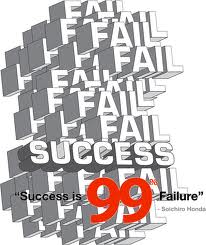 There is so much emphasis on product, improvement, and perfection at times that we often forget the value of failure in our practice. My endless pursuit of strategies to improve my own teaching has led me, on a daily basis, to a number of amazing educational blogs that I enjoy reading as I am constantly challenged to reflect on my own practice. As I scour the internet looking for insight, ideas, and examples of good teaching practice I find that, more often than not, the blogs I visit are wonderful and full of an amazing array of information. I appreciate how people share, I really do. However, the habit that I see many bloggers fall into, and I am very guilty of this myself, is documenting only our successes. Highlighting our successes is, of course, extremely valuable. After all, who wants to see anything less than this? Don’t get me wrong, I value success and the sharing of it, but success is a result of hard work, determination, trial and error, and reflection. Personally and professionally, I am very proud of the work that I do, but it comes as a direct result of hundreds of hours of planning and reflection. Over the years, I have had what I felt were many excellent ideas only to have them come crashing down on me, leaving me to question how good a teacher I really am. As I write this blog post, I am reminded by the fact that without failure and challenge, we would not know what the powerful concepts of persistence and resilience are all about. The vision that I have for PE in the 21st century is constantly changing as I learn new information, shuffle and dismiss old information as I test out different theories, and explore the multitude of research out there. I will encounter failure each step along this journey and must remember to document these times just as much as I document the things that go well in my program. Identifying our struggles and the burning questions that we have is an essential component in making the necessary improvement needed as educators.
My advice is to have a vision, to plan the best way we can for it, to execute it in the most efficient way possible, BUT continue to reflect on the true effectiveness of our teaching practice by looking at our failures and shortcomings as educators and set goals to improve.
0 Comments
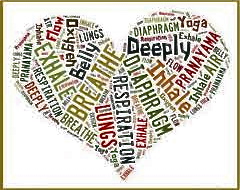 My wife, Neila Steele, is an elementary school teacher, but for years has also been a certified Yoga instructor. I have seen her teach yoga to children and adults for well over ten years now and have learned so many excellent activities and techniques that I can apply in PE and that classroom teachers can use as well. One of the techniques that she has consistently used over the years has been the 'Breath of Joy'. I have seen that the effects of doing the 'Breath of Joy' are immediate with everyone who has ever tried it. I have used the photo on the left as it represents the circulatory system and shows how the respiratory system is directly linked to it. The breath of joy has instantaneous effects on both of these body systems and can enhance learning in the classroom when used consistently over time. This activity is a wonderful way for kids (and adults!) to rejuvenate themselves, get oxygen flowing, and to stimulate the muscles and the mind back into action. This is a perfect go-to-strategy when our students have been seated for any length of time and is amazingly simple. Very little space is needed to complete breath of joy cycles.Thanks to my wife, Neila, for sharing her video of doing the 'Breath of Joy' with her grade 4 students. As you watch the video, keep in mind the pattern of breathing is 3 quick snorts of breath in, as you simultaneously move your arms in unison. The cycle is completed by a hard and complete exhale and folding of the body forward over bent and soft knees. Good luck with it! My friend and colleague, Marina Gijzen, sent me an excellent article from the Globe and Mail which was originally published on August 28th, 2012. The article essentially sums up research related to the importance of keeping our bodies active and that our ability to be innovative and to better learn is greatly enhanced by getting out and moving. Sure we have heard this over and over in the past, but it is an important point for all teachers to remember and to act on. Go to the link below to read the article and to see how some businesses now conduct their daily meetings. Imagine our staff meetings, from time to time, being held in a completely different format, for example, having important discussions as we walk around the track and then sharing our ideas afterwards. Research shows that it’s not just fitness that’s important for overall health but that sedentary time can have negative health consequences,” he adds. “People shouldn’t be sitting for more than 30 minutes at a time. Doing so affects everything from mental health to the musculo-skeletal system to cardiovascular health and brain health. Click on Workplace Well-Being article here. Enjoy and think about how we can change the way we interact in school settings.
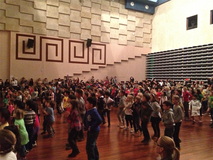 I am so happy that I was able to talk my administration into letting me culminate my movement composition unit in this fashion. Imagine, 350 students and well over 100 parents all dancing away together to the same songs. For our weekly assembly this week we pushed back the seats and let the students dance away. It was a very successful way to culminate my movement composition unit and the students were able to show off their skills. It is worth it to click the video below and watch. It is only about a 3 minute video. Great closure to the unit and lots of smiling kids, teachers, and parents. The video does not do justice to the actual moving, grooving, and shaking that was going on, but you'll get an idea as to how it all went. Thanks! My thought today is how lucky I am to be doing a job that I completely love. This very short video highlights my program and students in action in 1 minute and 51 seconds.
Care about creating sustainable change in PE? If so, watch the TedX below and pull concepts out that can be applied to 21st century PE. So important to make change now! 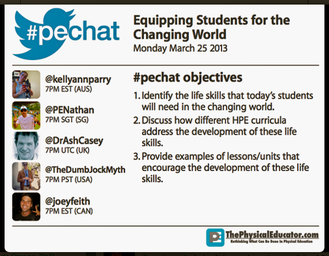 Apologies to all my #pechat friends. I have always intended on being a regular part of #pechat, but with 2 young kids, and loads of coaching duties, I have had very little time during the scheduled chats. I have popped in silently a few times over the months, but plan to be a regular from now on. Always super to hear the great views of others. I was happy to be a part of #pechat last night and look forward to many more opportunities to connect with so many great practitioners out there. As you can see, last night's chat was about 'Equipping Students for the Changing World' and lots of interesting and very relevant ideas were thrown about. If you were not a part of #pechat last night, but would like to give your input, please do so in comment box below and I will post it for you. Thanks! 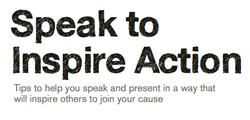 Once again I must turn your attention to a fantastic blogger whose work I follow regularly. She is insightful, creative, innovative, and her blog posts are very thought-provoking. Often times, I use her blog posts to initiate my own thinking within the arena of PE and today is no different, so I would like to share my thought of the day based on one of Sonya ter Borg's recent blog posts (here) and it is all about inspiring action in our students. The pictures of Speak to Inspire Action and the bold text in orange below come directly from Sonya's blog. I was fortunate enough to work with Sonya in the Hague last year on the PYP Sharing Blog project and it is here that I got to know more about her. I now consider her a friend and highly respect her work. As the PYP is all about students taking action, as physical educators, we must consider what this looks like in the programs we run. Back in September, a model for inquiry in PE that I had created was published here by the IBO and the final phase of my inquiry cycle dealt specifically with students taking action. However, as much as I hope that I can inspire kids to take action in regards to their learning in PE, I must reflect on the fact that outside of PE, I haven't observed this so much. Sonya's blog post on Speak to Inspire Action, got me seriously reflecting on ways that I can better promote action within my own PE program. Specifically, what does action look like outside of PE and how can it be measured?  If we are to try and promote action in PE, we must begin to look for ways to see whether or not action is actually taking place once our students leave our gymnasiums and other teaching spaces. We must listen to the conversations of our students in the hallways and out at recess. We must observe them during their play times to be able to see firsthand if action is happening. In my upcoming Athletics unit, I am taking a totally new teaching approach in which I blogged about last week here. I am giving students complete ownership over their learning by allowing them to design all of the activities that they will engage in. The learning engagements will based around the student learning outcomes that will be made clear to them at the beginning of the unit. In order for me to assess whether or not true learning is taking place, I must look for action and will do so by taking walks during morning break and at recess to see if any of my grade 3 and 4 students are taking their learning from Athletics and putting it into action during their own time. Sonya's blog post has helped me to reflect on action even more, but from the perspective of PE. I will report back on my blog over the next several weeks any action that has taken place. As PE instructors, how to you address action within your programs? I would love to hear back from you. A revolutionary approach to education that is extraordinary. Interested in learning about it? Click here. Would love to be a part of a school like this. My friend and colleague, Marina Gijzen, sent me the link this morning. I found a great quote on their website that I would like to share with you. The world doesn’t need more people with good grades. The world needs people who see the really tough problems as puzzles, and have the tenacity and creative capacity to solve them. - Gever Tulley, TEDxKids, 2011 The checklist for good PE practice that you see below is only for your consideration. They are essentials in my program that have served me well over the years and hopefully help in creating an environment where genuine and authentic learning takes place. Some things on the checklist may not seem PE relevant, but I would argue that if we are to develop the whole child and provide the the necessary skills to succeed both in and out of PE, we must foster cross-curricular learning whenever possible within our own subject area.
Help me add to the checklist and share other important considerations in a quality PE program. I would appreciate your comments below. Thanks! |
AuthorKAUST Faculty, Pedagogical Coach. Presenter & Workshop Leader.IB Educator. #RunYourLife podcast host. Archives
September 2022
|
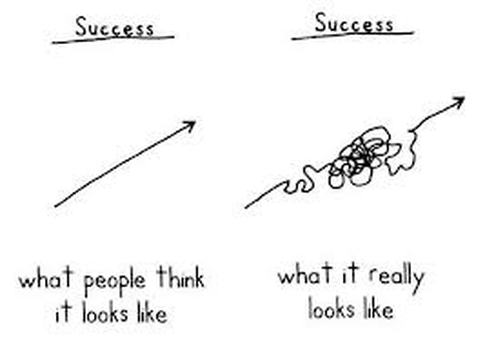
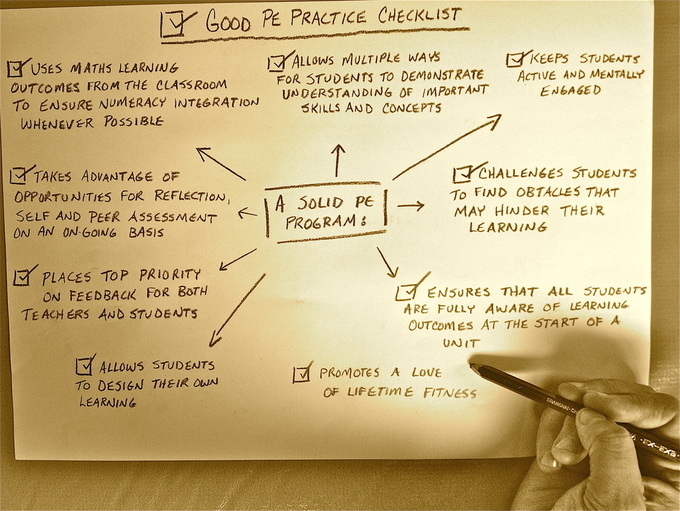
 RSS Feed
RSS Feed